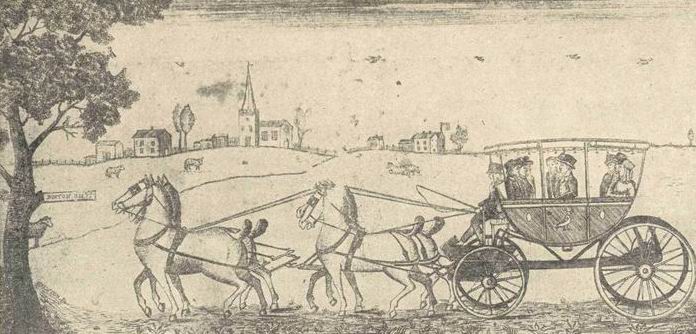|
1999-2003 (Return to Web Text-ures) |
Click Here to return to |
|
1999-2003 (Return to Web Text-ures) |
Click Here to return to |
THE FIRST STAGE—COACH LINE OUT OF BOSTON

From a print.
Collection of Bostonian Society.
AN OLD STAGE-COACH OF THE EARLY DAYS.
|
“Long ago, at the
end of the route, |
The first public stage-coach line from Boston was established in 1763 by Bartholomew Stayers, who had his headquarters at the Sign of the Lighthouse in the North End. The starting-point was in Charlestown in order to save the trouble of ferrying, and the coach ran to Portsmouth, New Hampshire. His conveyance was called the “Portsmouth Flying Stage-coach” and was built to carry “six persons inside, each person to pay 13 shillings and 6 pence sterling to Portsmouth, and 9 shillings to Newburyport; to set out every Friday morning, between six and seven o’clock; to put up at inns on the road, where good entertainment and attendance will be provided for the passengers in the coach. Returning, to leave Portsmouth every Tuesday morning.” The owner also announced that, as this was a convenient and genteel way of travelling and much cheaper than hiring carriages or horses, he hoped gentlemen and ladies would encourage the same. This first stage line was regarded with much astonishment, and its establishment was looked upon as a great achievement, and it may be imagined that no railway was later greeted with more enthusiasm than was the opening of this first stage-coach line between Boston and Portsmouth. Of the comforts of Mr. Stayers’s equipage the least said probably the better, for the coaches of ye olden time have been likened to everything from a distiller’s vat to a diving bell, with sundry violoncello cases “hung equally balanced between front and back springs” in between. The motion has been said to resemble “a ship rocking or beating against a heavy sea, straining all her timbers with a low moaning sound as she drives over the contending waves.” Nevertheless, in spite of discomforts New England folk would travel, and there must have been a certain elation in arising in the dim hours of the morning, partaking of a hot, fragrant, frugal breakfast, hearing the bustle and preparations, neighing of horses and calls of men in the tavern-yard, and setting forth on a long journey before dawn. There was the break in the monotony of things when horses were changed at a tavern farther on in the journey, the unmistakable interest when bits of news were related as the horses were harnessed, the gathering of loungers and village folk about the stage-coach, the crack of whips when the journey was again resumed, and at the end of the seemingly interminable journey the welcome and warmth of a good tavern where famished travellers might refresh themselves.
The next “stage-chaise” ran between Boston and Salem, and only a few years later another line was started to Marblehead by Edward Wade, who might be “spoken with at the widow Trefry’s in Fish (North) Street.” In 1814 a stage-coach line was put into operation between Boston and New York, which ran every three days. Longfellow, when he visited the Wayside Inn in 1840, wrote that “The stage left Boston about three o’clock in the morning, reaching the Sudbury Tavern for breakfast, a considerable portion of the route being travelled in total darkness, and without your having the least idea who your companions might be.” The accidents, however, are described as being very few and rarely fatal. When the railroads were first started there were some serious accidents, which caused one of the older Bostonians to remark: “You got upset in a coach, and there you were! You get upset in a rail-car — and, damme, where are you?”
The stage-drivers, in addition to their regular duties, frequently attended to the shopping orders of the people who lived along the line. One old driver in Ayer, Massachusetts, bought bonnets for most of the women on his route, and he always bragged that he used to purchase a great many but never two alike, and that he was the only one who could be trusted to perform this important task. The drivers insisted that they could change horses before the stage stopped rocking. The travellers as a rule were not so complimentary about their conveyance, as they often referred to the change as an exchange of prisons. Modern travel has its disadvantages and lack of picturesqueness, after all—and forever about the old stage-coach days will linger a breath of romance and the spirit of the fascination that accompanied the lumbersome coach and joys and discomforts of the road.